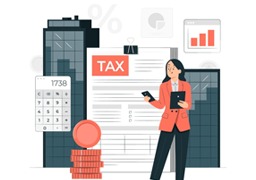# itr
12 posts in `itr` tag

Serving the Nation, Saving on Taxes: A Guide to ITR for Army Personnel
This blog post guides army personnel through the special tax exemptions and deductions available to them and helps them choose the right ITR form for filing their income tax return.

Transform Your Tax Filing Experience with Lifetime free eCA Membership
MyITROnline Global Services Pvt Ltd introduces the Lifetime free eCA Membership, offering unparalleled tax filing assistance at an incredible 50% discount. For just ₹2500, members receive expert guidance from chartered accountants, hassle-free tax filing, strategic tax planning, audit support, and secure document management. This membership provides continuous support, ensuring compliance with the latest tax regulations while saving time and money. Sign up now to take advantage of this limited-time offer and enjoy a stress-free tax filing experience with MyITROnline.
.jpg)
Excel Utility for ITR-5 AY 2024-25 Released: Streamline Your Tax Filing Process
The Income Tax Department has introduced the Excel Utility for ITR-5 for the Assessment Year 2024-25, simplifying the tax filing process for various entities. This user-friendly tool is now accessible on the official income tax e-filing portal and is designed for firms, Limited Liability Partnerships (LLPs), Association of Persons (AOPs), Body of Individuals (BOIs), artificial juridical persons, cooperative societies, and local authorities. The utility offers features like automated calculations, validation checks, and detailed instructions, ensuring accurate and efficient tax return preparation. Download the utility today to streamline your tax filing experience.

Understanding Note 7A: A Complete Taxpayer’s Guide for AY 2024-2025
Filing your income tax return for the Assessment Year 2024-2025 can be simplified with a clear understanding of Note 7A. This comprehensive guide explains how to accurately report income from other sources, claim deductions under Chapter VI-A, declare exempt income, and provide details about foreign assets and income. By following this step-by-step approach, taxpayers can ensure compliance with tax laws, minimize errors, and avoid potential issues with the tax authorities. Whether you're dealing with interest income, dividends, foreign assets, or various tax deductions, this guide has you covered for a smooth and successful tax filing experience.

Tax Returns & Forms for Salaried Individuals - AY 2024-25
This comprehensive guide provides salaried individuals with insights into tax returns and forms for Assessment Year 2024-25. Learn about essential documents like Form 16, filing due dates, and tax-saving opportunities to streamline your tax filing process.

e-Verification of Income Tax Returns: A Comprehensive Step-by-Step Guide
This comprehensive guide provides step-by-step instructions on how to e-Verify your Income Tax Return (ITR) using various methods such as Aadhaar OTP, Net Banking, Bank Account EVC, Demat Account EVC, Digital Signature Certificate (DSC), or Bank ATM. By following these detailed instructions, you can ensure the accuracy and authenticity of your tax return filing process, helping you stay compliant with tax regulations and avoid penalties.

Guide to Filing Income Tax Return (ITR) for New Taxpayers in India
This blog post provides a comprehensive guide for first-time taxpayers in India, covering the basics of ITR filing, types of ITR forms, documents required, and a step-by-step guide to filing taxes online and offline.

A Comprehensive Guide to Returns and Forms Applicable to Individuals with Income from Business/Profession for AY 2024-2025
This blog provides a detailed overview of the returns and forms applicable to individuals with business income for the Assessment Year 2024-2025 in India. From understanding the basics to filing tips, readers will gain insights into ITR-3, Form 16, Form 26AS, Form 44AB, and Form 10AA, along with key compliance strategies.

Returns and Forms Applicable for Hindu Undivided Family (HUF) for AY 2024-2025
As the Assessment Year (AY) 2024-2025 approaches, Hindu Undivided Families (HUFs) must be well-prepared for their tax filings. This guide provides a detailed overview of the returns and forms applicable to HUFs, helping ensure compliance and optimize tax liabilities. From understanding the nature of HUFs and their income sources to selecting the correct ITR forms and following the filing process, this comprehensive guide covers everything you need to know for a smooth tax season.

Understanding the New Scrutiny Guidelines for ITRs (FY 2024-25)
The new scrutiny guidelines for ITRs (FY 2024-25) provide transparency in the tax department's functioning and bring in a data-driven approach for identifying cases for scrutiny assessment. This blog post demystifies the new scrutiny guidelines for ITRs (FY 2024-25) and provides a comprehensive guide for taxpayers to ensure that they are compliant with the tax laws and avoid any potential scrutiny.

Have you received your Form-16? ITR Filing for FY 2023-24 (AY 2024-25) has started.
As the financial year 2023-24 concludes, it's time to file your Income Tax Return (ITR) for Assessment Year (AY) 2024-25. This blog post provides a comprehensive guide on using Form-16, a crucial TDS certificate issued by employers, to accurately and efficiently file your ITR. We cover everything from gathering necessary documents to verifying your return, along with common mistakes to avoid. Stay compliant and ensure a smooth tax filing process with our detailed instructions and tips. Start your ITR filing today

Choosing Between the Old and New Tax Regimes: A Comparative Analysis
Choosing Between the Old and New Tax Regimes: A Comparative Analysis" invites readers on a journey through India's tax landscape, offering a personalized exploration of the traditional and modern tax systems. With a human touch, this analysis illuminates the nuanced differences between the two regimes, empowering individuals to navigate their tax obligations with confidence. By delving into real-life scenarios and practical considerations, readers are equipped to make decisions that resonate with their unique financial aspirations and values, ensuring a path to financial well-being that aligns with their individual journeys.
